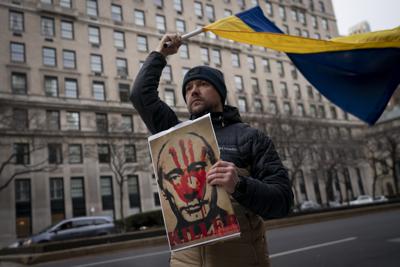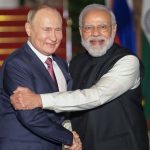By David Broder
Russia’s invasion of Ukraine is sickening. Vladimir Putin had this Monday claimed that the “Kiev regime” refused any resolution of the conflict in the Donbas except through “military means.” The Russian president now claims to resolve it with far more bloodshed, already spreading beyond the Donbas region and risking a wider conflagration.
Putin’s open disregard for Ukrainian independence expresses a reactionary civilizational politics, as expressed in his article scouring medieval myths for reasons to kill and maim in the present. True, he famously once claimed that the fall of the USSR was the last century’s “greatest geopolitical disaster.” Yet it was no accident that this week he cast Lenin as the “architect” of Ukraine, who had subverted an older and thus somehow more authentic tsarist imperial order.
Putin’s rule surely has drawn legitimacy from Russia’s post-Soviet malaise. His government’s credo of militarized stability built its support in an atmosphere of real popular despair following the destruction of the pre-1991 social order; a series of border conflicts have in turn radicalized its nationalist revanchism. But his insistence this week that he would “really decommunize” Ukraine, by dismantling it, showed his hatred even for the most formal Soviet rhetoric of “fraternity among peoples.”
Putin was not driven to invade by Western threat or by a small but militant far-right minority in Ukraine. Yet it should clearly be recognized that Western actions have helped prepare the way. This is not only because NATO’s post-1991 expansion has encircled Russia or empowered its militarists to claim that lands devastated during World War II are again under threat. More than that, Putin’s claim to stand up for minorities in the Donbas draws on a now well-worn playbook of “humanitarian” intervention.
To observe that those who destroyed Iraq, Libya, and Yugoslavia have no standing to condemn him is not an exercise in “both-sidesism.” The likes of Blair, Clinton, Trump, and Putin have often been on one same side, through material collaboration in the War on Terror and in their common undermining of the international law which they all claim to uphold. Time and again, Washington has allied with despots, come to see them as unreliable, then launched military offensives against them that succeeded only in spreading chaos. The Left has every duty to remember these disasters — and prevent them from being repeated in the present.
This war also has wider consequences on domestic politics, including in Russia, where a small organized antiwar left faces a mighty security state apparatus. It is far from clear that most Russians are really mobilized in support of the war: pollsters like the Levada Center suggest that there is much less unanimous support for recognition of the Donbas separatist republics (never mind a full-scale invasion of Ukraine) than was true with the 2014 annexation of Crimea. But open civil resistance will face a sharp clampdown.
If the conflict does remain limited to its current scope, its main victims will be civilians in Ukraine, on either side of the now-contested border in the Donbas. It is hard to predict how Volodymyr Zelensky’s government might respond, given the pressure from hardline nationalist forces domestically, the vast imbalance of forces, and his reliance on Western aid. His appeal to the Russian population, in the language which they share with so many in his home region, was surely admirable.
As for the United States and UK, even if they do not send troops to Eastern Europe, we can expect a warlike atmosphere perhaps echoing that which followed 9/11, with smears against supposed “stooges of Putin,” and clampdowns on media really or simply alleged to be Moscow-linked. A key focus of left-wing politics will be resistance against the already encroaching policing of public discourse by social media giants and state McCarthyism. Another will be to defend the right of refugees from the war — and its likely fallout on the global food supply — to settle in Europe.
In recent weeks, media-political rhetoric in Western countries has been heavily directed at delegitimizing the Left and antiwar forces domestically. This also points to its unreality and impotence with regard to events in Ukraine. Liberal pundits often speak of Putin’s hirelings on the European far left and far right; yet no socialist parties are funded by Russian bankers and oligarchs in the manner of British Tories, Marine Le Pen’s Rassemblement National, or Italy’s Lega. Putin’s erratic conduct has surely embarrassed them; socialists never admired him to begin with.
Even compared to the Cold War era, the Left in most countries is far less politically and organizationally prepared to deal with the present crisis, never mind act effectively to stop it. But we can at least rely on certain core principles: an unrelenting rejection of the use of military force; a refusal to justify one set of generals by citing the crimes of another; and, above all, a defense of our own right to speak without fear or accusation of disloyalty. (IPA Service)
Courtesy: Jacobin Magazine




 It Is Vladimir Putin’s War In Ukraine, Narendra Modi Can Have Little Role
It Is Vladimir Putin’s War In Ukraine, Narendra Modi Can Have Little Role 